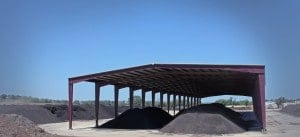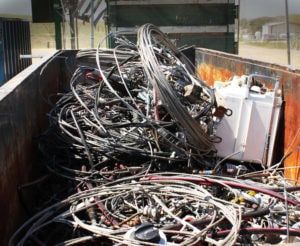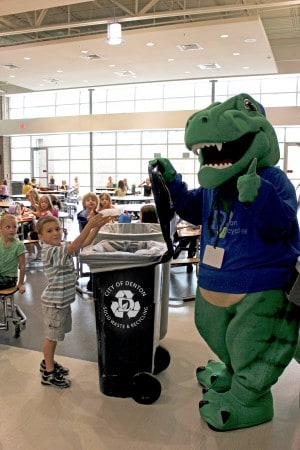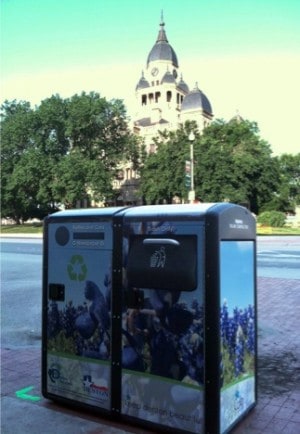In the Spotlight
The City of Denton, TX Solid Waste & Recycling Department: Turning Passion for Education into Diversification and Strength
Nurturing unique partnerships and outreach programs that help diversify and strengthen its services, Denton’s Solid Waste & Recycling Department is passionate about educating the public with regards to sustainable projects and environmental responsibility.
Denton, Texas is a culturally dynamic city that boasts a charming, historic downtown, unique shopping and dining, a vibrant, live music scene and a strong environmental consciousness. The city’s diverse community is supported by two universities, several major manufacturing companies, and a thriving health and medical industry. Denton is located 40 miles north of Dallas and is one of the fastest growing cities in the nation with a population of approximately 113,000.
Denton’s city council formed the Solid Waste Master Plan Advisory Committee in 1992 in order to accommodate long-term growth. The committee examined waste streams, waste management practices, community needs and recycling strategies for waste minimization, and established a 20-year integrated solid waste master plan under which the City of Denton Solid Waste & Recycling Department now operates.
The Solid Waste & Recycling Department employs 110 people and has a fleet of 80 vehicles servicing the City of Denton. The department manages municipal solid waste, and Class 2 and 3 nonhazardous, industrial waste, and household hazardous waste. Collection services include: residential curbside waste and recycling, recycling drop-off centers that support multi-family residents and small businesses, commercial waste, recycling and food waste, and household hazardous waste. Other department services include a Home Chemical Reuse Store, building materials recovery program and a landfill gas-to-energy program.
Staying Strong in a Weak Economy
The 2008 housing construction market downturn did not negatively impact the Solid Waste & Recycling Department’s operations, because the commercial construction market became increasingly involved in generating recyclable building materials through U.S Green Building Council’s Leadership in Energy and Environmental Design (LEED) programs. LEED project examples are Apogee Stadium at the University of North Texas and a Fitness and Recreation Center at Texas Woman’s University. These projects and others like them helped the department to increase its waste diversion rate. According to Solid Waste & Recycling General Manager, Vance Kemler, “In the last three years the department has increased its waste diversion rate from 26 percent to 30 percent. In the last year, the department created a Building Materials Recovery program (BMR) to accommodate the increased amount of building materials entering the landfill. The program recycles C&D material such as concrete, metal and wood. The BMR currently diverts 50 percent of the material it processes from the landfill.”
Partnerships and Programs
The Solid Waste & Recycling Department has unique partnerships and outreach programs that help diversify and strengthen its services. In 2008, the department partnered with DTE Biomass Energy to install a landfill gas collection system. The system covers the entire 63-acres of current landfill space, capturing gas, which is directed to an onsite DTE 1.6 megawatt electric power generator. The energy is then transferred onto the Denton Municipal Utilities electric grid where it is used to power approximately 1,600 Denton homes. “As a result, Solid Waste & Recycling receives a portion of gross utility sales to Denton Municipal Electric, the City’s electric department and the site has space to add two more generators,” Kemler says.Over the past few years, research projects have been conducted by the University of Texas at Arlington to monitor moisture distribution and determine the efficiency of leachate recirculation systems in the landfill to enhance gas production.
In addition, the City of Denton Wastewater Department partners with the Solid Waste & Recycling Department on a project that diverts bio-solids and yard waste from the landfill and converts those materials into a compost product called Dyno Dirt. A variety of Dyno Dirt products, including Dyno Landscape Mulch and Dyno Soil, is sold to the general public.
Studies conducted by the City of Denton and the University of North Texas show that compounds found in pharmaceuticals flushed down toilets are not removed during the wastewater treatment process, and are persistent in the environment. These compounds could possibly affect aquatic life and drinking water. For this reason, the Solid Waste & Recycling Department created the “Denton Drug Disposal Day” (D4) pharmaceutical take-back program in 2010 in order to respond to citizen concerns regarding disposal of unused medications. The Department’s Home Chemical Collection Program has hosted D4 events to collect unwanted and expired medications from Denton residents. Four scheduled events over a two-year period (2010 to 2011) collected and properly disposed of 2,556 pounds of unwanted medications.D4 has won several awards from organizations such as the Solid Waste Association of North America (SWANA), the Texas Chapter of the Solid Waste Association of North America (TxSWANA), North American Hazardous Materials Management Association (NAHMMA), State of Texas Association for Recycling (STAR), and the Greater DFW Recycling Alliance. Household Hazardous Waste Supervisor, Victoria Hodge says, “In fact, the program ended up being so successful that it led to the installation of a public drug disposal kiosk at the City of Denton Police Department.”
Public education and community outreach are keys to the success of the department’s programs. Alana Presley, Department’s Education Coordinator has a passion for educating the public about how the City of Denton is different than others with regards to sustainable projects and environmental responsibility. “We partner with local businesses, universities and non-profits on events such as the Bicycle Recycle Tour with Scrap Denton and Querencia Community Bike Shop and a Tree Giveaway with Keep Denton Beautiful. Our Sustainable Schools program, which includes 34 Denton area schools, provides a platform for sustainable education to students, teachers and administrators,” Presley says. A recent Sustainable Schools workshop brought local teachers and non-profits together to share ideas for reuse education and practice (see Program Descriptions sidebar).
Safety and Training
Employee training and certification requirements meet City of Denton policies and Texas Commission on Environmental Quality (TCEQ) rules. The TCEQ Chapter 30 Texas Administrative Codes that the department adheres to are Municipal Solid Waste Occupational Licensing, Industrial & Hazardous Waste, and Waste Minimization & Recycling. Additionally, training and safety meetings are scheduled once a month for all employees and a variety of topics are covered, which include: fire protection, prevention, and evacuation, emergency response and personal protective equipment. Employees are evaluated annually by supervisors to ensure they receive appropriate job training.
Successes and Challenges
Introducing new services and guidelines to citizens and encouraging their participation can be challenging. “When our curbside recycling pilot program began, it was expected to be met with some citizen resistance,” Kemler said. However, despite these initial concerns, the service ended up having a 70 percent participation rate in the first year due to a large portion of the community’s desire to recycle as well as an intensive marketing and public education campaign, which used television and movie theater advertising, utility bill stuffers, newspaper advertising and residential service guides mailed to homes.
A recycling program without a nearby processing facility was difficult to justify because transportation and labor costs outweighed the revenue. In 2011, a Materials Recovery Facility (MRF) allowing for a closed-loop lifecycle for local recyclable materials was created in Denton through a public-private partnership with Pratt Industries. Pratt is America’s fifth largest box manufacturer and the world’s largest, privately-held 100 percent recycled paper and packaging company. As a result, Denton boasts achieving a closed-loop lifecycle for recycled cardboard. “When a Denton resident places a cardboard box into a blue recycling cart, it is taken to the local Pratt MRF. At the MRF, the box is bailed with other cardboard materials and shipped to a paper mill in Shreveport, LA where it is then processed into a roll of paper,” Presley says. “The paper roll is then sent to a Pratt Box Plant in Fort Worth and made into a new box. The cycle is completed as the box gets delivered to a home improvement store in Denton where a resident buys it to move furniture.”
Upcoming Programs
Conserving landfill space and resources are important goals of the Solid Waste & Recycling Department. Currently, the Department faces the challenge of finding cost-effective solutions for building materials and food waste diversion. “The volume of wood waste is high, but the accessible markets for the product are few and not very diverse. Converting food waste into feed for livestock provides the highest market value for the product; but transportation costs outweigh the revenue. Making compost is another valuable use for food waste. The challenge is finding enough clean food waste to meet the market demand,” Kemler says. A current pilot program uses pre-consumer food waste from local grocery stores to enrich the Dyno Dirt compost product.
For now, the Solid Waste & Recycling Department is focusing on its future plans. Says Kemler, “Landfill mining, or recovering recyclables from old landfill cells, increasing selectivity for gas-generating materials that enter the landfill, and researching alternative energy programs are our long-term goals.”
For more information about the City of Denton Solid Waste & Recycling Department, contact Vance Kemler, Solid Waste and Recycling General Manager,at [email protected].
Volunteers collect unwanted medications from citizens at a Denton Drug Disposal Day event.
Teachers create scrap material boxes for their classrooms and share ideas for communicating reuse principles to students.
The Dyno Dirt composting operation is a result of a partnership between the City of Denton Solid Waste and Recycling and Wastewater departments.
A gas well that stores methane gas from the landfill until it is ready to be converted into electrical energy.
Construction materials recovered by the Building Materials Recovery program.
Recyclesaurus Rex visits students at a school that participates in the Sustainable Schools Program
Cart collection truck.
Home Chemical Collection ReUse Store.
Solar-powered recycling and trash compactors on the Denton Square.
Photos courtesy of the City of Denton Solid Waste & Recycling Department.
Sidebar
Program Descriptions
The Bicycle to Recycle Tour is a community bike ride that highlights clean-air transportation and recycling. The bike ride begins on the Denton Square and stops to tour the Pratt Materials Recovery Facility (MRF) to see how recycling is sorted and bailed.
Keep Denton Beautiful’s Annual Tree GiveAwayprovides free trees to City of Denton residents in celebration of national Make a Difference Day.
The City of Denton Solid Waste & Recycling Department’s award winning Sustainable Schools Program was developed in 2005 to assist schools in environmental education and sustainable practices. The vision of the program is to inspire youth and their families to value and participate in a sustainable world through education, outreach, collaborations and community partnerships. In 2009, the Sustainable Schools Program won the U.S. Conference of Mayors’ Outstanding Achievement Award for City Livability.









